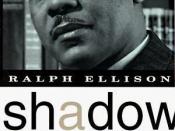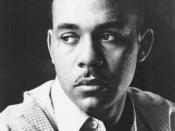"Cruelty and Racism in "Battle Royal"
Battle Royal is the first chapter in a novel called "The Invisible Man." "Ralph Ellison," who lived 1914 - 1994, based this novel on the life of a young black man, the narrator, living in the world of cruel racism. The narrator's life was a fine example of racism. The white people, in this story, are merciless and malicious. Ellison's definition of racism incorporates a high degree of cruelty; he tells how white people take pleasure in being cruel to the black folk, especially in the fight scene.
The white people enjoy the heartless acts that they perform. Before the battle royal begins, cruel white men, yell, and "Get going in there. Let me at those black sonofabitches! Tear him limb from limb." (309) White folks blindfold the narrator and other black boys then throw them into a ring, where they pound at each other to the bloodthirsty screams of the audience.
The narrator, scared for his life, hears more and more people screaming at him and the others. He tries to push the blindfold aside and a cruel voice says, "Oh no you don't, black bastard! Leave that alone!" (310) All of the white people are eager to see the senseless mayhem that is about to happen.
Ellison describes the brawl as a full bloodbath. The white people do not care that the blacks are being humiliated and injured. They still enjoy this brutality. The men continue yelling," Slug him, black boy! Knock his guts out! Uppercut him! Kill him! Kill that big boy!" (310) By pushing the blindfold partly free, the sweaty and bloody narrator escapes some of the blows. The only thing the narrator knows is that the white folk loves every bit of this cruelty.
The fight is over and the white people want more carnage. The M.C. calls to the fighters "Come on up here boys and get your money." (312) Knowing the rug is electric; the man unsympathetically says, "There it is on the rug." (312) On top of the rug, there are coins, crumpled dollar bills, and a few gold pieces. The white man knows that the black people have no wealth and will be very swift to grab the money. As they gather around the rug, the narrator hears someone whisper, "This ought to be good." (312) The M.C. says, "Ready. Go!" (312) Lunging for the yellow piece, the narrator gets hit first shock. White people throw a perspiring guy on top of the rug and watch his body dance with voltage. After he rolls off the rug, everybody finds the scene more amusing. The narrator grabs one man's chair, to keep from getting thrown, and he obtains the response, "Leggo, nigger! Leggo!" (313) Scared for his life, the narrator continues to grab for the money and is careful not to get to close to the rug.
The racism in this short story is very descriptive. Ellison tells of how much the white folk, in this story, get pleasure from being callous towards the narrator and the other black boys. Throughout the entire fight and bloodshed, all the white people do is ridicule and encourage the fight. Not one person cares for the men that are being harassed and beaten. All everyone wants is senseless cruelty.


